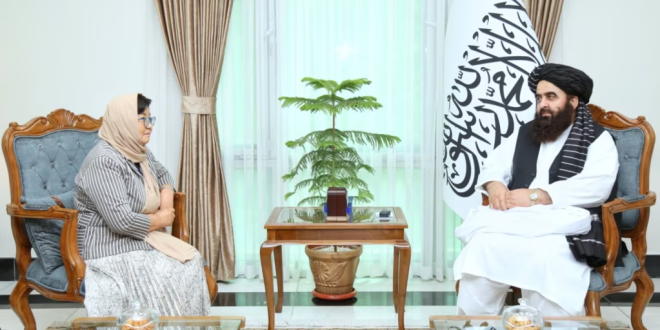AT News
KABUL – The United Nations is finalizing the agenda for a pivotal two-day international conference on Afghanistan, aiming for broad acceptance from all parties. Roza Otunbayeva, head of the U.N. Assistance Mission in Afghanistan, met with Taliban Foreign Minister Amir Khan Muttaqi in Kabul to discuss the details and necessary coordination for the June 30 conference in Doha, Qatar.
Referred to as “Doha III,” this will be the third meeting in Qatar’s capital initiated by U.N. Secretary-General Antonio Guterres, aiming to develop an effective international approach to the Taliban-governed country amidst severe humanitarian, economic, and human rights crises.
Otunbayeva emphasized the importance of an inclusive agenda, while Muttaqi pledged close cooperation. The U.N. has yet to comment on the meeting.
The contact comes amid increasing calls for Afghan women’s representation at the conference, with activists criticizing the U.N. for engaging with the Taliban while sidelining women’s rights. The Taliban, who didn’t participate in the first two meetings, have signaled informal intent to join the upcoming discussions, pending the final agenda.
Rights organizations, including Human Rights Watch and Amnesty International, expressed concern over the U.N.’s approach, arguing it risks legitimizing Taliban rule at the expense of Afghan women’s rights. Heather Barr from Human Rights Watch highlighted the worsening women’s rights crisis in Afghanistan and criticized the U.N.’s efforts to appease the Taliban.
Despite criticism, U.N. officials defend their engagement with the Taliban, stressing their role as Afghanistan’s de facto authorities and the persistent urging for the protection of women’s rights. The Taliban had previously demanded exclusive representation at the conference, excluding civil society and women’s rights activists.
 Afghanistan Times
Afghanistan Times




